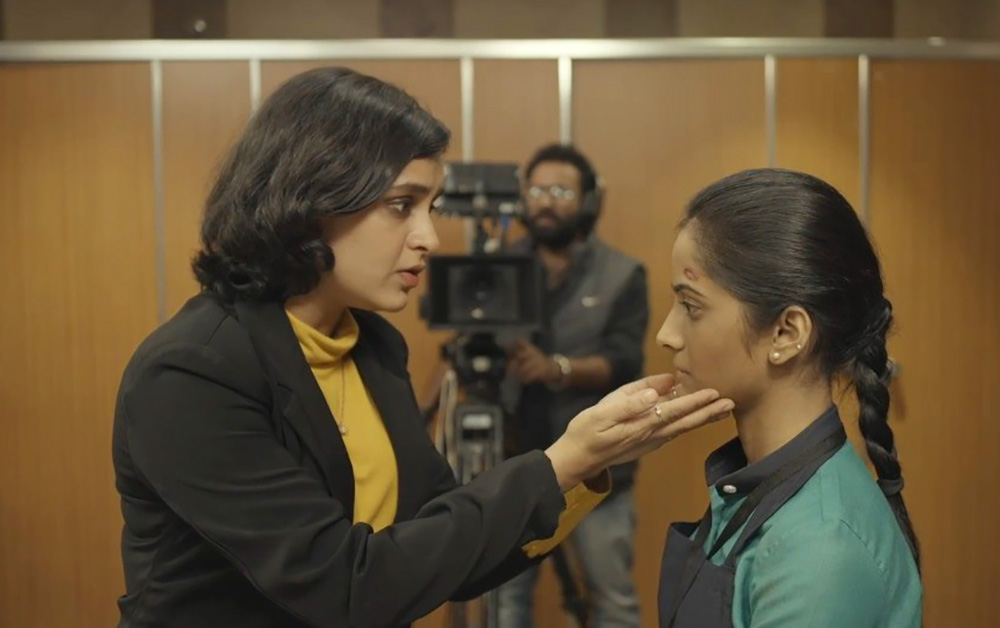The short bilingual (Marathi and Hindi) drama “Didi” is centers around a demure, soft-spoken janitor who only goes by the moniker Didi. She finds her workspace intruded upon by a demanding filmmaker hurrying to finish a project about women empowerment. After a junior artist doesn’t show up on set, he blows a fuse. He consequently casts Didi as the next best option to play second fiddle to the lead heroine.
“Didi” then follows the bemused janitor as the filmmaker thrusts her into the spotlight with little-to-no knowledge about her role in the movie. She only has the filmmaker’s overworked but tolerant female aides patiently guiding her with a few pointers. While initially Didi is encouraged to ad-lib her lines, soon she and her fellow female co-star find themselves treated as puppets at the mercy of the filmmaker’s male gaze. Their every movement and dialogue is either dictated or undermined by the looming presence of the man behind the camera. His knowledge of women’s empowerment (and the harsh realities women face in general) is sadly superficial. It could even put his primarily female cast and crew at a risk of losing their identities and voice in the process.
‘Didi’ is a Nuanced and Apt Social Message
The short film benefits from nuanced writing by Director/Writer Madhura Dalimbkar, and also acts as a scathing yet balanced social commentary. It shows how individuals with good intentions (but limited knowledge) can do more harm than good to those they seek to empower. It also shows how an out-of-touch mindset can lead to the further propagation of regressive ideologies. In “Didi’s” case, it leads to women being reduced to mere caricatures.
The film conveys this message via the mentality of the filmmaker of the movie-within-a-movie in “Didi” whose motivations are as unclear as a foggy bathroom mirror. He views himself as a self-proclaimed savior of all womankind. However, he ultimately only ends up utilizing Didi as a mute bystander and prop for the film. The film designs her character to stand in as the stereotypical ‘manic pixie’ trope. She only exists to impart guidance to the heroine’s cookie-cutter girl-boss role, rather than actually fleshing her role out and letting her speak for herself.

The filmmaker’s sexism is also on full display here. He shouts a barrage of insults and shuts down the opinions of his female workforce whenever they occasionally suggest changes to the characterisation of Didi. This also occurs when they share their lived experiences in efforts to add depth to the female character(s) who are otherwise just reflections of his narrow-minded attitude.
Touching Upon Sexism and Classism with Careful Hands
The character of Didi is easy to sympathise with, as well as is her perseverance and stoic attitude when it comes to putting up with the film crew’s incessant demands. She also shines in moments such as when she silently allows the makeup artist to touch up the fresh bruises on her forehead so they appear more prominent on camera, and in her ability to take the most harshly-worded criticism with a smile.
The movie also touches upon classism in scenes such as when Didi attempts to speak out about the domestic abuse and financial hurdles she faces in real life, only to find herself belittled and stifled by the director. He refers to her turmoil as a ‘third world problem’ that his target audience won’t be able to connect with. He even goes so far as to term her toxic home-life as ‘inescapable destiny.’ In an early scene, a similar insensitive and classist behaviour can be witnessed. The makeup artist displays her prejudice at the very thought of applying make-up to a ‘lowly’ janitor.
Great Performances from the Cast
Lead actor Ketaki Kulkarni exudes a natural screen presence and emotes well, bringing sincerity and charm to the titular Didi. Ajeet Singh Palawat lends ample support with his effective performance as the erratic and indecisive filmmaker. Additionally, the supporting cast does justice to their respective roles as well.
“Didi” is currently doing the rounds of the film festival circuit (I was able to catch a recent screening at this year’s Bangalore International Film festival), so do try and watch it. It is a thought-provoking film that might even encourage society to put in the efforts to become a better ally towards women.
“Didi” is currently doing the film festival circuit, and is not available for streaming.
Support the Site: Consider becoming a sponsor to unlock exclusive, member-only content and help support The Movie Buff!